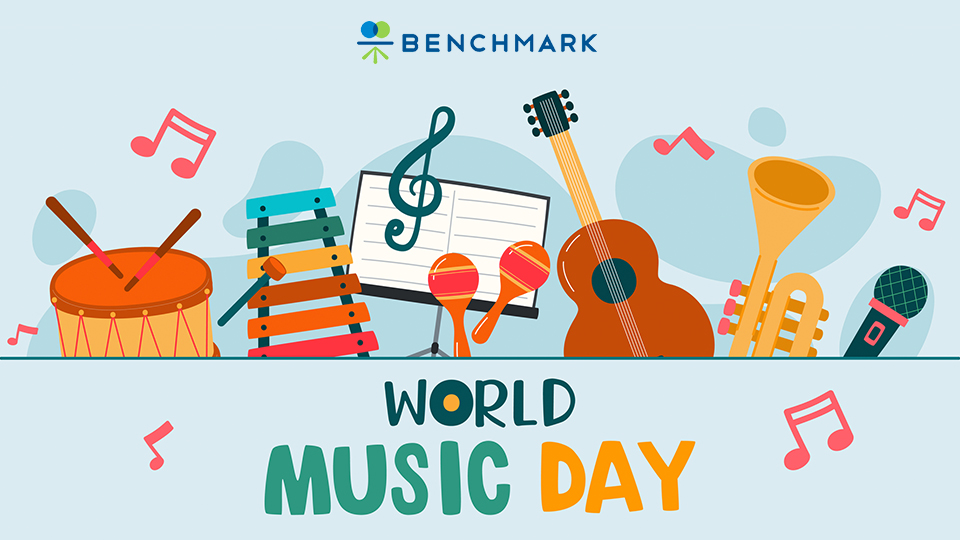World Music Day: The Power of Sound

Hans Christian Anderson once wrote, “Where words fail, music speaks.” If you’ve ever been transported through the power of music, you know this to be true. Think of the last time you heard a song that brought you right back to a happy memory—or the last time you heard a melody that moved something deep within your spirit. Music has a way of giving us more than we could ever think to ask for, be it the gift of perspective, catharsis, recollection, or pure and simple joy. The beautiful thing about music is that it only asks us for one thing in return: that we take time to listen.
The World Music Day celebration was first launched in France in 1982 as a way of formally acknowledging the way music lifts us up and brings us closer together. Today, more than 120 countries take part in observing the special June 21st holiday. People gather from far and wide to commemorate World Music Day by playing, listening, dancing, and singing to music. Everyone from classically-trained musicians, to part-time doo-woppers, to garage band rock stars spend the day spreading positivity and promoting peace through music.
Here at Benchmark, music has long played a significant role in the lives of our residents. Many of them have never missed a single community concert or impromptu piano performance. The choirs and singing groups across our communities also serve as a way for our residents to express themselves while bonding with their fellow songbirds.
Music serves as a bridge between residents, providing a connection point that transports them back to generational experiences. It brings back fond memories of dancing at wedding receptions, humming a tune to help little ones fall asleep, embarking on a family road trip with the radio turned up, and so much more. Music also connects residents and associates, providing them something to discuss, reminisce about, dance to, and share joy in.
That’s why music is an integral part of Benchmark programming. We make it a point to cater to all musical tastes so that everyone feels welcome to join in the fun. We embrace programming that allows residents to experience music together, such as live concerts, musicals, discussion groups, and watching operas on TV. Many Benchmark communities also have small percussion instruments on site so that residents can dance, sing, and play tunes of their own creation.
Of course, beyond the joy that music imparts, it also provides our residents with a laundry list of benefits. Research has shown that listening to music can reduce anxiety, blood pressure, and pain, as well as improve sleep quality, mood, mental alertness, and memory. Here’s a detailed breakdown of how music does so much more than soothe the soul.
Socialization
Countless friendships have been sparked by a little ditty played on one of our communal pianos or during our drum circle programming. Music has the astounding ability to bring us back to our shared experiences and be a grounding force for relationships. It’s a universal language that offers our residents a way to connect and engage, reducing the likelihood that they feel lonely or isolated.
Stimulation
Have you ever heard a song that “scratched the itch” in your brain just so? That’s because music helps stimulate the mind, and often in a way that gets our residents swaying to the beat and singing along. As it turns out, experiencing music is a full brain workout! When people play instruments, sing, dance, and reminisce, they are using many different parts of the brain with ease. Music is also heavily connected to emotional memory (amygdala) which is often untouched by dementias such as Alzheimer’s. Music can help trigger memories associated with a certain time and place and bring one right back to that moment. It also keeps residents engaged, promotes mental alertness, and can help reduce the risk of cognitive decline.
Physical Rehabilitation
What’s good for the soul is often good for the body, and music is no exception. It can be used in programming to encourage residents to get up and move. It’s also been found to help improve mobility and coordination.
Improved Mood & Emotional Support
Few things are as powerful as music when it comes to stirring up emotion. Music has been shown to improve mood and reduce symptoms of depression—which is especially important for residents who may be struggling with anxiety, or physical or mental health issues. Music can help reduce anxiety when used with deep breathing techniques. Also, a good mood sparked by a well-curated playlist can make all the difference, as our programing directors well know. Sometimes all it takes to put a smile on our residents’ faces is a song that brings them right back to the good old days.
Enhanced Sensory & Cognitive Stimulation
Music can act as a key that unlocks the rest of our senses—it can help us think more clearly, feel deeper, and unlock memories. For residents, it can not only stimulate the senses, but improve memory, attention, and language skills as well, making for an improved quality of life.
This June 21st, we hope you and your loved ones spend World Music Day appreciating all there is to love and learn from music. Turn up the stereo, put on your favorite headphones, or dig up that old record or CD you once listened to on repeat. Music is personal to each individual, it represents a piece of our identity, culture, community, joy and memories. Find a quiet time to let music do the talking.


